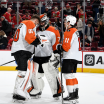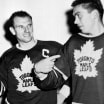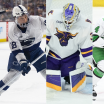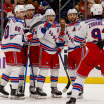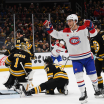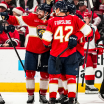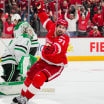Legendary hockey reporter and analyst Stan Fischler writes a hockey scrapbook for NHL.com. Fischler, known as The Hockey Maven, shares his knowledge, brand of humor and insights with readers each week.
Today, Stan offers his remembrances of Hockey Hall of Famer Maurice Richard of the Montreal Canadiens and one of the most memorable playoff goals of all time. Stan worked with Richard, who retired 60 years ago (Sept. 15, 1960), and ghosted his autobiography, "The Flying Frenchmen."
Richard's highlight-reel goal sank Bruins in 1952 Semifinals
'Rocket' scored spectacular series-winner in Game 7 after returning from on-ice collision
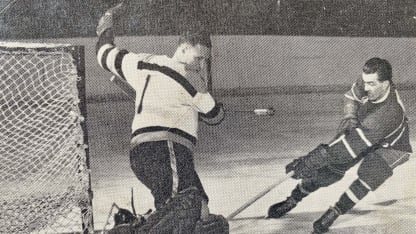
By
Stan Fischler
Special to NHL.com
Maurice "Rocket" Richard
, the Hall of Fame right wing who retired 60 years ago (Sept. 15, 1960) after 18 seasons with the Montreal Canadiens, combined raw strength, fierce determination, francophone passion and a knack for scoring like no other player in the Original Six era.
One of Richard's most intimidating rivals, Detroit Red Wings center
Sid Abel
, once was asked if Richard could be stopped.
"Sure, he can be stopped." Abel replied thoughtfully. "With a gun."
Richard, inducted into the Hockey Hall of Fame in 1961 (the Hall waived its requirement that a player be retired for three years before being considered) was a hero among heroes in Montreal and truly one of a kind. "Spectacular" refers to a big, beautiful production. Richard orchestrated so many spectaculars that it was hard to keep count.
"Rocket once scored a goal against me carrying not one but two guys on his back,"
Emile Francis
remembered from his days as a goalie with the Chicago Black Hawks (then two words) before going on to a Hall of Fame career as a builder.
Glenn Hall
, a Hall of Fame goalie renowned for his fearlessness (he once played 502 consecutive regular-season games without a mask) admitted that the sight of a speeding Richard actually frightened him.
"When Maurice came flying toward me with the puck on his stick, his eyes were all lit up, flashing and gleaming like a pinball machine," he once allowed. "It was terrifying."
If one Richard goal could be singled out as more stunningly spectacular than the others, it was the one he scored at the Montreal Forum in Game 7 of the 1952 Stanley Cup Semifinals between the Canadiens and Boston Bruins.
The Montreal-Boston rivalry was as heated as any during the Original Six era. Richard and Bruins forward
Leo Labine
were the keenest of enemies and feuded constantly. What made their respective fires burn even more intensely during the 1952 Semifinals was that the Bruins were on the brink of ousting the heavily favored Canadiens from the playoffs. Boston led 3-2 in the best-of-7 series and 2-1 in the third period of Game 6 when Bruins goalie
Jim Henry
was flattened by a shot that barely missed his eye but crushed his nose.
Henry went off for repairs (teams didn't carry a spare goalie in those days), then returned well-bandaged and with his vision partially blurred. Richard scored with 8:55 remaining in the third period to send the game into overtime before a goal by rookie Paul Masnick at 7:49 of the second overtime
gave Montreal a 3-2 win
.
Now it was April 8, 1952;
Game 7
-- showdown time at The Forum in a match that one reporter described as "clean, hard-fought and played with fine spirit."
All true, except for the moment when two opposing bodies crashed on the ice during the second period. The score was tied 1-1 when Richard split Boston's defense, tripped and fell to his knees when Labine hit him head-on. Labine's stick thudded against Richard's head while his knees connected with Richard's stomach like a battering ram. Already horizontal, Richard rolled over on his back.
The crowd wondered if he was still alive. Trainer Hector Dubois, physiotherapist Bill Head and teammate
Bert Olmstead
surrounded Richard, who eventually responded to smelling salts.
Blood covered Richard's face from a deep cut over the left eye as he was escorted to the Forum infirmary. Although the cut was stitched and repaired, he was in no shape to return. At least that's how it looked to everyone but Richard.
"My legs felt fine," he later recalled, "but my head was dizzy. I didn't remember anything after I was hit. They told me it was Labine. I don't know. I didn't even know the score when I eventually went back to the bench."
Coach Dick Irvin, who was like a big brother to Richard, had no intention of letting him onto the ice again. But even Maurice's presence on the bench was encouraging and inspirational to his teammates.
Watching from the press box, former linemate Toe Blake turned to a reporter and said, "You watch. The Rocket will get one in the last five minutes of the game."
The score remained tied 1-1 well into the third period, giving onlookers the sense that the next goal would win the game and the series. Meanwhile, Richard convinced Irvin to let him take a turn on the ice.
Then, it happened. With less than four minutes remaining, Richard was on right wing, hoping for the puck. Defenseman
Butch Bouchard
had just taken it from Boston's
Woody Dumart
and spun around. He spotted Richard near the blue line and fired a pass that just barely eluded Dumart. It landed on Richard's stick as he went into high gear, jabbing the puck ahead of him.
Bruins defenseman
Bill Quackenbush
, a future Hall of Famer himself, raced back and was sure he had Richard right where he wanted him, angling his rival into the right corner.
"I was on the left side just then -- normally I played the right side -- when the Rocket started coming down toward me," Quackenbush said. "I chased him into the corner. He seemed too far from the net to do any damage."
Montreal Star columnist Baz O'Meara felt the same way.
"Rocket looked too deep for a shot," O'Meara wrote, "but then he suddenly did a deft cut to his left."
What no one could have known at the time was that Richard was moving on autopilot. Dazed yet determined, he plowed forward like an airplane in a fog trying to find the landing strip.
"I thought I had him closed off," Quackenbush remembered, "but he made that quick turn and was moving out. My defense partner was a rookie and because of his lack of experience he neglected to cut off Richard."
Meanwhile, Henry's two blackened eyes were riveted on Richard. Wisely, or so it seemed, he hugged his left post, negating any chance for a wraparound.
But there was an anomaly in Richard's repertoire that gave him an advantage: He was a left-handed shot playing right wing. Thus the puck was on his left side, closer to the net, as he barreled past the flailing Quackenbush.
Henry stayed at the corner of the net, allowing Richard nothing but the seemingly impossible angle shot to the far corner of the net. Almost atop the goalie's pads, Richard deked Henry, who expected a wraparound, and released his shot. It was low and hard, one that Henry never managed to see, let alone touch. "One minute I was facing him, waiting for the shot," he said. "The next he had whizzed by and the puck was in the net."
The eruption of cheers and the length of roars from the Forum crowd captured the imagination of even veteran newsmen who had witnessed many a Richard masterpiece.
"Richard has received ovations in his day, the likes of which have never been seen in the Forum," O'Meara said. "But the ensuing roar, which lasted fully four minutes, followed by a paper shower, left all others in the also-ran class."
Reactions to the goal were arresting, to say the least.
Elmer Lach
, who was sitting on the Montreal bench when the Rocket went into orbit, leaned forward on the sideboard and fainted.
Art Chapman, manager of Buffalo's American Hockey League team, was watching from the press box and stood with his mouth agape after the red light flashed. "Only Richard could score like that," Chapman said.
Said Irvin, "He is like Babe Ruth was. Rocket adds that extra flourish to everything."
The goal, scored at 16:19 of the third period, proved to be the game-winner.
Billy Reay
scored into an empty net with 34 seconds remaining to wrap up a 3-1 victory that sent Montreal into the Stanley Cup Final.
"In all his storied, starry career, Richard has scored some of the most spectacular goals in hockey history," O'Meara wrote. "No player has ever matched him as a thrill-producer. No one has come close to him for versatility of execution. Of all the goals credited to him, none ever excelled this game-winner or scored under the pressure of pain."
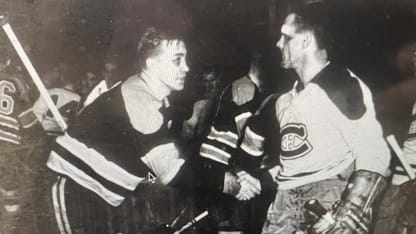
Only later, when reporters jammed the winners' dressing room, was the extent of Richard's "pain" revealed. As Maurice fell onto a bench, his father, Onesime Richard, walked over, put his arm around his son's shoulder and hugged him. No longer able to control the emotion that welled within his battered body, the Rocket broke down and cried.
What else can one say about Richard? Perhaps Canadian author Peter Gzowski best summed up his persona.
"The Rocket," Gzowski concluded, "was the epitome of recklessness, of untrammeled fire and fury and abandon on the ice."
Richard put it more simply.
"I can only play one way," he said. "The hard way!"
Photo contributions from the collection of James Laverance









